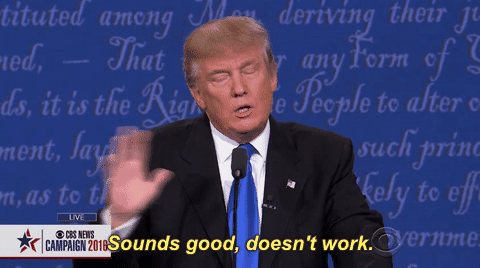Arjun Yadav's Webpage
Trade War? Nothing Ever Happens
2025-05-30
There seems to be a sense of fear among many regarding the prospect of global trade as the result of the ongoing trade war and the war cry of "we want to be self reliant economy with indigenous products" by many countries. This fear, predominantly driven by mainstream media, has led many to take pessimistic view on global trade so much so that even the educated ones in the field of finance are recommending to take money out of various investments and put that money into some glittering yellow stone called gold. USA which was once considered to be the defacto place to park your money during global turmoil has now made some experts recommend gold over it due to this trade turmoil and uncertainty. Apparently this yellow overpriced, overhyped, soft as butter, useless in a zombie apocalypse, piece of stone has more value for some reason than the birth place of my friend's favorite Taylor Swift. This is evident if we compare the growth in gold prices vs US stock market index in last one year. It is not only the increasing demand for gold as a safe store of value but the distrust by investors in existing global trade system can also be seen in increased trade in alternate assets such as Bitcoin whose value is all time high.
But I am not writing this to amplify the ongoing pessimism or to give you any investment advice or speak about the 'nEw wOrLd OrDEr'. What I am trying to say is how irrelevant this trade war and indigenous/self-reliant drive is for the long term optimistic prospects of the global trade. Let me address both of these points one by one.
"But we are at a trade war"
Nations have always tried to increase their trade surplus, hence there is nothing new or surprising with that but this inherent characteristic became 'the trade war' when the two biggest economies viz US and China came face to face for economic and geopolitical reasons. However, the sheer share of these two economies in global trade ended up evolving the rest of the world as their battle ground. Hence the name 'global trade war'. From the Trump's perspective the world has taken an unfair advantage of USA's free market and that's why USA is having consistent trade deficits for years, no actually for decades now. China being one of the biggest trade partner with USA has the biggest trade imbalance with it (-$279 Billion!). For once US can accept its fate and be okay with its trade deficits as it is nothing new for it at this point. Pretty much a normal thing since 1990s. But the fact that China is having trade surplus after trade surplus is problematic since that collected wealth is being used against United State's interests in geopolitics. However, despite the current troubling situation the US-China trade relationship was not always like this, just a decade or so ago they both took each other as respectable major trade partners, which they still are but without the respect part. The so called trade war between them started around in 2018 with the launch of new trade barriers. And ever since then trend of US trade deficit against China has almost stagnated if not increased (aggregate till now). And now after the 2nd term of Trump, his tariff warship strikes has left the world with uncertainty, fear and anger. That's why we see jump in the trade of gold and Bitcoin, both reaching all time high value, and being seen as alternate investments with good prospects amid global tensions.
However, there is one interesting thing, it has been almost 7 years since this trade war but the US's and its partners (EU) tariff weapons have done little to no harm to the aggregate China exports: in 2024 alone China had a $1 trillion trade surplus. And the answer to that is very much simple as stated by many, that China was able to reroute it supply chain from US and Europe to south east Asia and Latin America with an astonishing success and at such an ease that has surprised the policy makers of the west.
One more fear which looms among many is that US will use its power to kind of 'order' small economies to reduce their trade with China. However, the recent push by US to force Latin American countries to cut trade with China is not working either. For the Latin American countries, according to OAS chief "Cutting china trade will tip Latin America into disaster". For the smaller economies which depend heavily on China and US exports equally, for them choosing one would not be acceptable. Apparently its not that easy of either of the countries to make big shift in global trade merely by force.
For USA however, playing this chicken game of tariffs to get a favorable situation for USA in trade is coming out to a somewhat as expected conclusion. US is too big of a trade partner for most of the world to just ignore, this can be seen in the number of countries who came forward to comply with Trump's demand of tariff reduction. India, Pakistan you name it! Seemingly the rich class of every country is forcing its diplomats to rush to US and cut the deal.
One more thing which puts faith in the better prospects for global trade in the recent times is the failed case of US and west's sanctions on Russia and Iran. To explain that let me first give you an historical example, almost 600 years ago when the Ottomans conquered Constantinople, in order to take revenge from the Europeans which they disliked, the Ottomans imposed fees onto the European traders which used the the Silk Route. As a result the Portuguese were incentivized to develop new sea route to reach Asia which end up reducing the relevance of the Silk Route. And the Ottoman's attempt to power play failed. Clear example of "when there is a will, there is a way." The incentives or the will has always been high in the global trade. And the world is big enough to find ways with or without west's approval. The same has happened with Iran and Russia, that despite all the sanctions they are still being able to sell the oil using their shadow fleets which fall beyond the radar of the west. America is well aware of this fact I suppose that's why it's very less likely that they will risk forcing other big boys to make their own official silk routes which the US won't be the part of.
In respect of these events, my best educated guess is that the so called 'global trade war' is in its final stage. Beating China's manufacturing and global trade prowess is not that easy, the US has understood it. And the world has understood that treating US as a big cash cow is no more that easy either. I suppose in the long term we will look back to this trade war and say "oh yes at that time there was a minor tussle of trade but everything eventually came back smooth."
"But my leader said we will be self reliant economy with only indigenous products"

There is nothing wrong with being self reliant and strong. But imagine, as an individual, if I say that I want to be self reliant and don't want to depend on others, to the extent that I will stop going to restaurant and make my own food. And vegetables? I will grow them in my own field. I will not consume someone else reels, I will make my own and doomscroll myself. Wait what? Sounds absurd, because it is. Self reliance is good but I can't do all by myself. At some point have to trust the division of labor. The same is true for nations as well.
This is basic commonsensical point, but for some reason there are people who have completely missed it. It is commendable to pursue self reliance on key products such as of military. But there is no way a country can be master of all trades. Despite having $1 Trillion trade surplus in 2024, China's total imports were more than $2.5 Trillion (More than India's combined Import and Export for the same year). Even if a country like china which amounts to approx 30% share of global manufacturing can't be completely self reliant then how can be others?
Moreover, it seems like the call to 'indigenous products' is more driven by political reasons than economic. For instance, when some countries told Apple that if they want to sell iphones in their country, it must have "Made in this banana republic" sticker on it. Apple had to comply with it in some countries. But did it really succeed? It turns out that essentially the iphones which were sold in the banana republic has a minimal value addition in the country, just final stage assembly and pasting of the sticker "Made in this banana republic".
Ironically the drive for indigenous products will end up increasing the global trade instead of reducing it. "We will make our own fighter jets and won't rely on the imports." Guess what the chips for you fighter jet will be coming from Taiwan, technology from Europe and duct tape to paste everything together and call it a jet from some other country. But that's good, if the country succeeds in producing a cheap yet better fighter jet, other countries will purchase it. But if it fails, that particular country will import it from the global market. A win-win situation for global trade prospects.
Nothing ever happens
Finally, with my best educated guess I can say that the mid to long run prospects of global trade are positive despite the ongoing tussle between various countries. Even sanctions and trade barriers becomes ineffective if the desire to do trade is high as we saw in the case of Russia and Iran. As more countries get affected by sanctions, the chances of the formation of new silk route looms, which the US won't have control on. US is smart enough to understand that. Hence, it is as eager to cut trade deals with sanctioned countries as the sanctioned countries are (we can see that happening with Iran).
The indigenous drive, whether it fails or succeed, will have the positive impact on global trade, as more you produce, more input you require, and good luck finding all the input in your own country.
Finally, of all the things that never gonna stop, global trade is never gonna stop the most.
